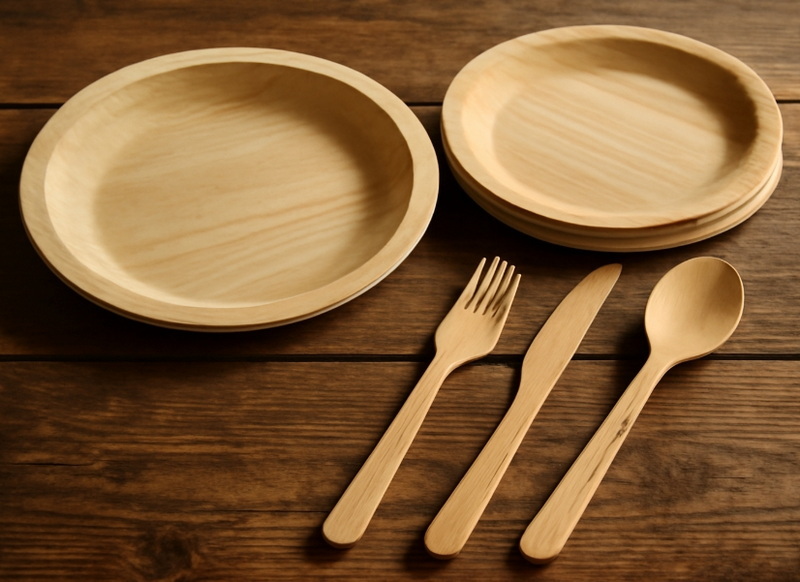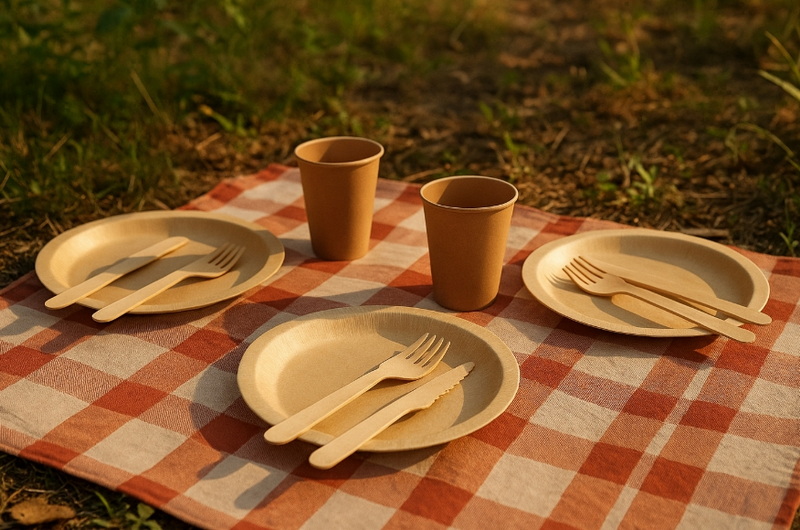
Content Menu
● The Rise of Disposable Cutlery in Germany
>> Market Overview
● Key Materials Used by German Manufacturers
>> 1. Birchwood
>> 2. Bamboo
>> 3. Compostable Bioplastics
● Top Disposable Cutlery Manufacturers And Suppliers in Germany
>> 1. GRÄWE
>> 2. Duni Group (BioPak)
>> 3. Wisefood GmbH
>> 4. GREENBOX GmbH & Co. KG
>> 5. PAPSTAR GmbH
>> 6. Franz Mensch GmbH
>> 7. Leef Blattwerk GmbH
>> 8. Verive
>> 9. Hosti International GmbH
>> 10. PacknWood
● Expanding Market Trends and Sustainability Efforts
● How to Choose the Right Disposable Cutlery Supplier in Germany
● OEM and Customization Services in Detail
● Environmental Impact and Regulations
● Future Outlook and Innovation
● Conclusion
● Frequently Asked Questions
>> Q1: What is the most eco-friendly disposable cutlery material available in Germany?
>> Q2: Can I order custom-branded disposable cutlery from German suppliers?
>> Q3: Are disposable cutlery products in Germany compliant with EU regulations?
>> Q4: What are the main distribution channels for disposable cutlery in Germany?
>> Q5: How do I choose the right disposable cutlery supplier for my business?
In recent years, Germany has emerged as a leader in sustainability, especially within the food service sector. The shift from traditional plastic to eco-friendly disposable cutlery is not just a trend but a necessity, driven by strict regulations, consumer awareness, and a national commitment to environmental stewardship. This comprehensive guide explores the top disposable cutlery manufacturers and suppliers in Germany, their product offerings, evolving market trends, and how businesses can benefit from partnering with these industry leaders.

The Rise of Disposable Cutlery in Germany
Germany's disposable cutlery market has evolved rapidly due to increasing environmental concerns and the EU's ban on single-use plastics. The demand for sustainable alternatives such as wooden, bamboo, and compostable bioplastic cutlery has soared, prompting manufacturers to innovate and expand their product lines.
Market Overview
- The German wooden disposable cutlery market is projected to reach $18.9 million by 2031, with a CAGR of 3.5% from 2024 to 2031.
- Major growth drivers include strict environmental regulations, consumer preference for green products, and the food service industry's need for convenient, hygienic solutions.
- Wooden and bamboo cutlery, especially those made from birchwood, are now the preferred choice for businesses and consumers alike.
Key Materials Used by German Manufacturers
1. Birchwood
Birchwood is fast-growing, renewable, and often FSC-certified. It is lightweight, strong, and smooth, making it ideal for disposable cutlery. Its natural appearance also appeals to eco-conscious consumers.
2. Bamboo
Bamboo is durable and naturally antibacterial, making it a popular material for disposable cutlery. Its rapid growth and renewability contribute to its eco-friendly profile.
3. Compostable Bioplastics
Compostable bioplastics are made from plant-based polymers and are suitable for both hot and cold foods. These materials align with EU sustainability goals and are increasingly used as alternatives to conventional plastics.
Top Disposable Cutlery Manufacturers And Suppliers in Germany
Below is a curated list of leading disposable cutlery manufacturers and suppliers in Germany, highlighting their specialties and contributions to the industry.
1. GRÄWE
- Location: Germany
- Specialty: Eco-friendly disposable cutlery made of wood and bamboo, as well as reusable plastic cutlery.
- Product Range: Knives, forks, spoons, and complete cutlery sets. Their products are biodegradable, sturdy, and ergonomically designed.
- Use Cases: Weddings, barbecues, catering, and daily use.
- Sustainability: Focuses on natural materials and practical, stylish designs.
2. Duni Group (BioPak)
- Location: Germany (with a global presence)
- Specialty: Wide range of biodegradable and compostable cutlery, especially for the catering industry.
- Product Range: Wooden and bamboo knives, forks, spoons, and cutlery sets.
- Sustainability: Products comply with EU regulations and focus on reducing plastic waste.
3. Wisefood GmbH
- Location: Germany
- Specialty: Innovative, eco-friendly disposable cutlery, including edible and compostable options.
- Product Range: Wooden cutlery, edible spoons, and sustainable packaging.
- Sustainability: Known for responsible sourcing and unique product innovation.
4. GREENBOX GmbH & Co. KG
- Location: Germany
- Specialty: Sustainable packaging and disposable cutlery for food service and retail.
- Product Range: Wooden, bamboo, and compostable bioplastic cutlery.
- Sustainability: Focuses on eco-friendly materials and compliance with environmental standards.
5. PAPSTAR GmbH
- Location: Germany
- Specialty: Comprehensive range of disposable tableware, including wooden and bamboo cutlery.
- Product Range: Knives, forks, spoons, and full cutlery sets.
- Sustainability: Emphasizes recyclable and biodegradable products for events and catering.
6. Franz Mensch GmbH
- Location: Germany
- Specialty: Disposable cutlery and hygiene products for the food service sector.
- Product Range: Wooden, bamboo, and plastic cutlery, including ice cream spoons.
- Sustainability: Offers both traditional and eco-friendly options.
7. Leef Blattwerk GmbH
- Location: Berlin, Germany
- Specialty: Leaf-based disposable plates and cutlery as alternatives to plastic.
- Product Range: Plates and cutlery made from pressed leaves, 100% biodegradable.
- Sustainability: No trees cut down for production, inspired by traditional Asian methods.
8. Verive
- Location: Germany (European presence)
- Specialty: Disposable wooden cutlery made from responsibly sourced birchwood.
- Product Range: Wrapped and unwrapped cutlery, multi-item packs, beeswax-coated options for enhanced mouthfeel.
- Sustainability: Focuses on circular economy, high quality, and compliance with EU plastic bans.
9. Hosti International GmbH
- Location: Germany
- Specialty: Disposable cutlery for food service, events, and retail.
- Product Range: Wooden, bamboo, and plastic cutlery.
- Sustainability: Offers SUP-compliant and eco-friendly alternatives.
10. PacknWood
- Location: Global (with distribution in Germany)
- Specialty: Biodegradable and compostable disposable cutlery, emphasizing design and sustainability.
- Product Range: Bamboo, wood, and bioplastic cutlery for catering and retail.
- Sustainability: Strong focus on innovation and eco-friendly materials.

Expanding Market Trends and Sustainability Efforts
The disposable cutlery market in Germany is not only growing but also evolving with a strong emphasis on sustainability. Manufacturers are increasingly investing in research and development to create products that minimize environmental impact while maintaining functionality and aesthetic appeal. This includes exploring new materials such as wheat straw, palm leaves, and other agricultural by-products that can be transformed into durable, biodegradable cutlery.
The push for circular economy principles is evident, with companies adopting practices that promote reuse, recycling, and composting. This shift is supported by government incentives and consumer demand for transparency regarding product lifecycle and environmental footprint. Many German manufacturers now provide detailed information about the sourcing, production, and end-of-life options for their disposable cutlery, allowing businesses and consumers to make informed choices.
How to Choose the Right Disposable Cutlery Supplier in Germany
Selecting the ideal disposable cutlery manufacturer or supplier involves several considerations:
- Material: Choose between wooden, bamboo, or compostable bioplastics based on your sustainability goals and intended use.
- Durability: Ensure the cutlery can handle the types of foods you serve, especially for catering and takeout.
- Compliance: Confirm that products meet EU and German regulations regarding single-use plastics and compostability.
- Customization: Many suppliers offer OEM/ODM services, allowing you to brand cutlery for your business.
- Pricing and MOQ: Compare prices, minimum order quantities, and delivery times to match your business needs.
- Certifications: Look for FSC, BRC, BSCI, SGS, and LFGB certifications to ensure quality and safety.
A careful evaluation of these factors will help businesses select a supplier that not only meets operational needs but also aligns with their sustainability values.
OEM and Customization Services in Detail
OEM (Original Equipment Manufacturer) and ODM (Original Design Manufacturer) services have become a cornerstone for many disposable cutlery manufacturers in Germany. These services allow businesses to tailor products to their specific needs, whether through unique designs, branding, or packaging solutions. Customization extends beyond aesthetics; it also includes functional adaptations such as enhanced durability for certain food types or ergonomic designs for better user experience.
This level of customization helps brands stand out in a competitive market and meet the growing consumer expectation for personalized and sustainable products. Additionally, many manufacturers provide consultation services to help clients choose the best materials and designs that align with their sustainability goals and market positioning.
For international buyers, especially brand owners, wholesalers, and food service providers, the ability to order custom-branded cutlery with unique packaging and design is a significant advantage. This flexibility enables businesses to reinforce their brand identity and respond quickly to market trends.
Environmental Impact and Regulations
Germany, in alignment with the EU, has implemented strict regulations against single-use plastics. The 2021 EU ban has accelerated the adoption of wooden and compostable cutlery, making compliance a key consideration for businesses. Manufacturers have responded by investing in sustainable materials and production processes, ensuring that their products are both functional and environmentally responsible.
Environmental certifications and compliance with international standards are now expected from leading disposable cutlery manufacturers and suppliers in Germany. Certifications such as FSC (Forest Stewardship Council), BRC (British Retail Consortium), BSCI (Business Social Compliance Initiative), SGS, and LFGB (German Food and Commodities Act) are commonly sought after to ensure products meet safety, quality, and sustainability benchmarks.
Future Outlook and Innovation
Looking ahead, the disposable cutlery industry in Germany is poised for continued innovation. Emerging technologies such as 3D printing and bioengineering are expected to play a role in developing next-generation products that are even more sustainable and customizable. The integration of smart packaging and digital tracking could also enhance supply chain transparency and consumer engagement.
Furthermore, collaborations between manufacturers, research institutions, and environmental organizations are likely to accelerate the development of new materials and production methods that reduce waste and carbon footprint. These advancements will not only benefit the environment but also provide businesses with new opportunities to differentiate themselves and meet evolving regulatory requirements.
The market is also witnessing the rise of B2B e-commerce platforms, making it easier for businesses to source disposable cutlery directly from manufacturers. This digitalization streamlines procurement processes, reduces costs, and allows for greater transparency and traceability throughout the supply chain.
Conclusion
Germany's disposable cutlery market is dynamic, innovative, and increasingly sustainable. With a strong focus on eco-friendly materials, regulatory compliance, and customization, the country's manufacturers and suppliers are well-positioned to meet the growing global demand for responsible single-use solutions. Whether you are a brand owner, wholesaler, or food service provider, partnering with a top German disposable cutlery manufacturer ensures quality, sustainability, and a competitive edge in today's green economy.

Frequently Asked Questions
Q1: What is the most eco-friendly disposable cutlery material available in Germany?
A1: Wooden and bamboo cutlery, especially those made from FSC-certified birchwood, are considered the most eco-friendly options, as they are biodegradable, compostable, and sourced from renewable resources.
Q2: Can I order custom-branded disposable cutlery from German suppliers?
A2: Yes, many manufacturers and suppliers in Germany offer OEM and ODM services, allowing you to customize the design, material, and packaging, and even print your logo on the cutlery.
Q3: Are disposable cutlery products in Germany compliant with EU regulations?
A3: Leading manufacturers ensure their products comply with strict EU and German regulations, including the ban on single-use plastics, by offering sustainable alternatives like wood, bamboo, and compostable bioplastics.
Q4: What are the main distribution channels for disposable cutlery in Germany?
A4: Disposable cutlery is distributed through wholesale, retail, supermarkets, hypermarkets, and direct-to-consumer channels, catering to both the food service industry and households.
Q5: How do I choose the right disposable cutlery supplier for my business?
A5: Consider factors such as material, durability, compliance with regulations, customization options, pricing, and certifications to ensure you select a supplier that meets your business needs and sustainability goals.

















